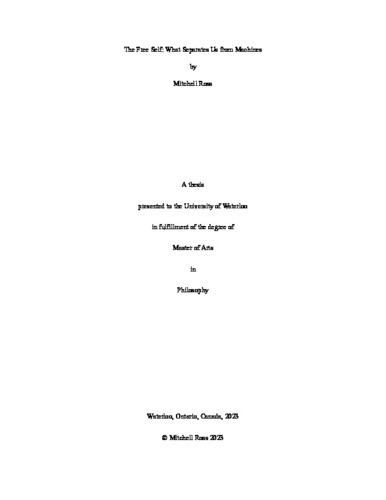| dc.description.abstract | Could a machine ever achieve consciousness? Will it ever make sense to hold a machine morally responsible? In this thesis, I argue that the architecture of SPAUN - the largest WIP functioning brain model currently in existence - makes it the most plausible contender for strong AI status, but that a hypothetically completed, future iteration of SPAUN is not guaranteed to possess qualitative experiences, consciousness, free will, or selfhood despite its biological plausibility; it therefore cannot be held morally responsible the way we are. To justify this position, I offer critiques of determinism, compatibilism, micro-functionalism, physicalism, and naturalistic accounts of the evolution of consciousness, as well as experiments in neuroscience that appear at first glance to disprove free will. In opposition to these views, I develop a novel form of dualism which posits the self as the free, non-physical, uncaused cause of its own actions, and provide arguments to justify this position. In essence, I propose - counter to Daniel Dennett - that selves are free to do otherwise (in the classical sense), that this is their purpose, and that naturalistic accounts of the existence of selfhood, consciousness, and qualitative experiences are inadequate because they lack a view to this purpose. I conclude that because SPAUN is a physically determined system, and its underlying substrate is distinct from our own, we should be wary of ascribing cognition and moral responsibility to it, since function alone does not guarantee cognition in this novel dualistic framework. | en |

